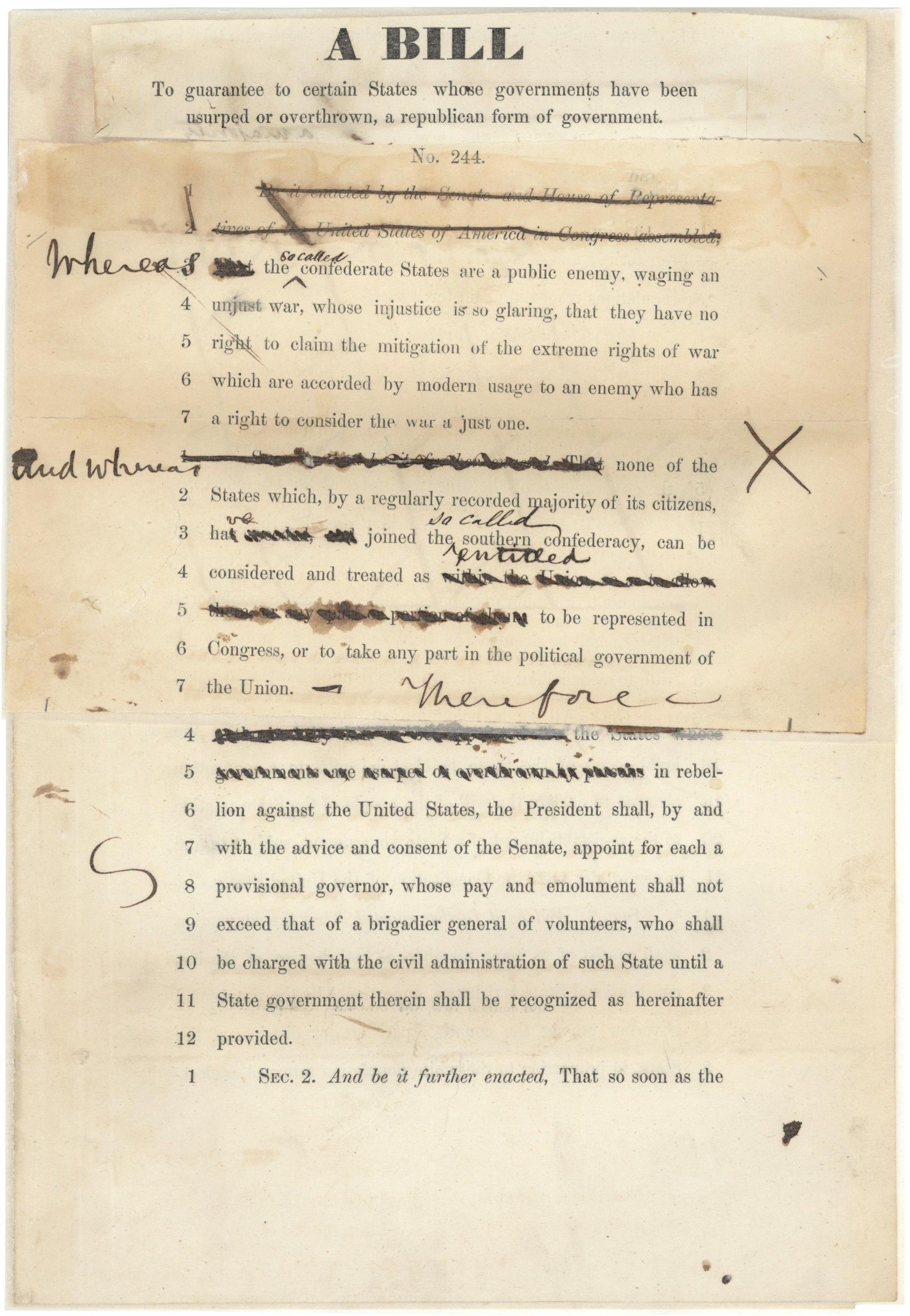Wade-Davis Bill, as Amended
5/4/1864
Add to Favorites:
Add all page(s) of this document to activity:

In late 1863, President Abraham Lincoln and Congress began to consider the question of how the Union would be reunited if the North won the Civil War. In December, President Lincoln proposed a reconstruction program that would allow Confederate states to establish new state governments after 10 percent of their male population took loyalty oaths and the states recognized the permanent freedom of formerly enslaved people.
Several congressional Republicans thought Lincoln’s 10 percent plan was too lenient. Senator Benjamin F. Wade, of Ohio, and Representative Henry Winter Davis, of Maryland, proposed a more stringent plan in February 1864.
The Wade-Davis Reconstruction Bill would also have abolished slavery, but it required that 50 percent of a state's White males take a loyalty oath to the United States (and swear they had never assisted the Confederacy) to be readmitted to the Union. Only after taking this "Ironclad Oath" would they be able to participate in conventions to write new state constitutions.
Congress passed the Wade-Davis Bill, but President Lincoln chose not to sign it, killing the bill with a pocket veto. Lincoln continued to advocate tolerance and speed in plans for the reconstruction of the Union in opposition to Congress.
After Lincoln’s assassination in April 1865, however, Congress had the upper hand in shaping federal policy toward the defeated South and imposed the harsher reconstruction requirements first advocated in the Wade-Davis Bill. Some of the policies included in this bill were implemented in a series of four Reconstruction Acts (1867-1868), which were passed into law after Congress overrode the vetoes of President Andrew Johnson.
Several congressional Republicans thought Lincoln’s 10 percent plan was too lenient. Senator Benjamin F. Wade, of Ohio, and Representative Henry Winter Davis, of Maryland, proposed a more stringent plan in February 1864.
The Wade-Davis Reconstruction Bill would also have abolished slavery, but it required that 50 percent of a state's White males take a loyalty oath to the United States (and swear they had never assisted the Confederacy) to be readmitted to the Union. Only after taking this "Ironclad Oath" would they be able to participate in conventions to write new state constitutions.
Congress passed the Wade-Davis Bill, but President Lincoln chose not to sign it, killing the bill with a pocket veto. Lincoln continued to advocate tolerance and speed in plans for the reconstruction of the Union in opposition to Congress.
After Lincoln’s assassination in April 1865, however, Congress had the upper hand in shaping federal policy toward the defeated South and imposed the harsher reconstruction requirements first advocated in the Wade-Davis Bill. Some of the policies included in this bill were implemented in a series of four Reconstruction Acts (1867-1868), which were passed into law after Congress overrode the vetoes of President Andrew Johnson.
Transcript
A Bill to guarantee to certain States whose Governments have been usurped or overthrown a Republican Form of Government.Be it enacted by the Senate and House of Representatives of the United States of America in Congress assembled, That in the states declared in rebellion against the United States, the President shall, by and with the advice and con- sent of the Senate, appoint for each a provisiona1 governor, whose pay and emoluments shall not exceed that of a brigadier-general of volunteers, who shall be charged with the civil administration of such state until a state government therein shall be recognized as hereinafter provided.
SEC. 2. And be it further enacted, That so soon as the ...
This primary source comes from the Records of the U.S. House of Representatives.
National Archives Identifier: 5049648
Full Citation: Wade-Davis Bill, as Amended; 5/4/1864; Bills and Resolutions Originating in the House, 1789 - 1974; Records of the U.S. House of Representatives, Record Group 233; National Archives Building, Washington, DC. [Online Version, https://www.docsteach.org/documents/document/wade-davis-bill, April 23, 2024]Activities that use this document
- To What Extent was Reconstruction a Revolution? (Part 1)
Created by the National Archives Education Team
Rights: Public Domain, Free of Known Copyright Restrictions. Learn more on our privacy and legal page.
